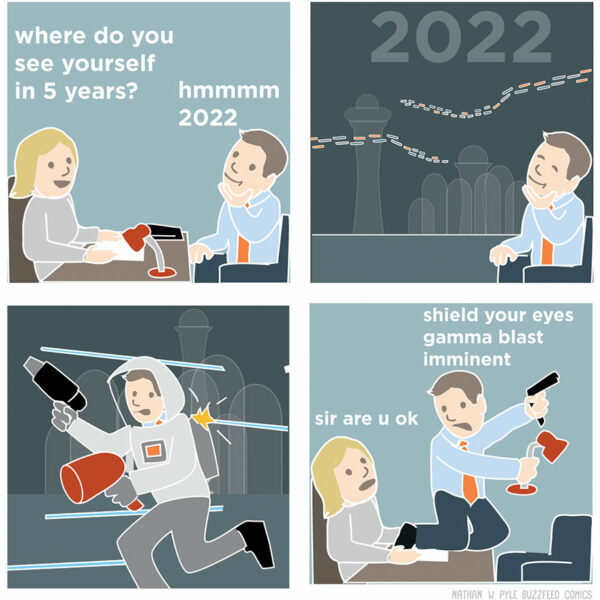Warning: Controversial post alert! This may make your blood boil, but if it does, please feel free to add a venomous comment or two after reading.
This is a topic I’ve wanted to approach for a few years now and is really more of an open question to the digital community… why do developers live by different rules than others at work?
Note: The term ‘developer’ in this article really means anyone working in a digital environment on the production side.
The ‘rules’ I’m referring to are specifically surrounding the use of Twitter, blog reading, YouTube, Facebook, flexitime and all of the other things that now seem to be a widely expected, and to some extent, accepted part of everyday life in many digital agencies out there i.e. things that many view as a sign of people not doing the job they’re being paid to.
The context switching argument
As a Digital Project Manager I’ve heard the two-pronged ‘context switching’ argument a billion times:
- More efficient working:
- If there wasn’t so much context switching due to meetings and people coming over to me I would work more efficiently.
- Reason for poor quality or late delivery:
- It’s taken longer due to all of the context switching I experienced.
As someone who, albeit unbelievable to some these days, genuinely used to code for a living, I can completely testify that both of these positions are 100% valid. When you’re coding, designing, or even writing a functional specification or creating a big project schedule – being in ‘the zone’ with no distractions is a must, and distractions are such a pain in the arse for momentum.
However, the point to which I elude to above is that it’s not just coders who work better when context switching is kept to a minimum, but it does seem that these are who you hear about from the most – why is that?
And why is it that having a Twitter client permanently on-screen where Tweets are popping up every second, distracting you unexpectedly from your work is considered to be not context switching?
Personal experience
The only reason I’m genuinely curious to hear answers from people on this is because I personally find having things such constantly open on my screen to be a terrible distraction that seriously impedes my productivity and focus.
In fact, I find it worse because it tends to be a more frequent occurrence than someone coming over to me or a short-notice meeting being arranged. If I can see a meeting is arranged for two hours time, I’ll tend to work around this necessity rather than complain about it like it’s some big surprise I wasn’t expecting, as do pretty much all other Digital Project Managers I’ve worked with – incidentally these people rarely seem to have Twitter open permanently, even the ones who used to design or code.
Is it that I’m just useless as being able to balance these things with my work focus, or is it that it distracts developers just as much as me but they wouldn’t like to admit it in case this culture is stopped dead in its tracks?
Developer’s justification
I’ve discussed this subject for quite a few years with developers in various workplaces and forums, and the common reasons given for this culture being a beneficial one tend to boil down to:
- It enables me to keep up to date with the latest goings on in the industry.
- Having a five minute break to browse Twitter or YouTube helps me relax.
- I can’t be expected to work every minute of every day.
My answers to these have remained fixed over the years:
- Is there really any industry news that you or the company will benefit from by you knowing about it now as opposed to in a few hours when it’s your lunch, or after work that day?
- Fair enough, but often it seems more like more than five minutes, just saying…
- Why not, I do (*kind of)
*Caveat: I fully admit I think I talk more than I should at work, usually distracting my very hard-working Digital Project Manager colleague, and I also take 2-3 cigarette breaks a day, but you know what, many developers do these things also, on top of the ‘Twitter-thang’.
So is it that it’s simply a case that this culture is beneficial to companies, or is it one that isn’t from a commercial perspective, but is just what we’ve all become conditioned to over the years?
A beneficial culture or merely tolerated?
As an employer or Digital Project Manager, this is ultimately the big question. I don’t know the answer to this, but as far as I see the point and counterpoints are clear.
Point
Digital folk are a unique bunch of people who generally have a passion for the industry that exceeds the boundaries and hours of their day job.

More to the point, an employer or Digital Project Manager would rather have people with this passion on their team than those who do not as they’ll tend to go above and beyond, stay up to date with the latest trends and technologies and be more dedicated to the solutions they provide, as opposed to those who see their job as just a job and clock off on time every night.
By promoting a culture where they’re allowed to have Twitter open all day long and read blog posts during work hours means you attract and retain the passionate people in the industry rather than the clock watchers.
Developers can choose when to context switch to Twitter, YouTube or blog posts, as opposed to ad hoc disruptions from Digital Project Managers, this timing makes all the difference.
Not permitting this culture would result in the passionate people leaving and a ‘corporate’ environment ensuing, and who wants to work in a corporate environment where every minute of every day is tracked.
Counterpoint
If developers spent less time looking at Twitter, YouTube and blog posts throughout the day more work would get done. If more work gets done, the company is more productive and generally more profitable, which means salaries, perks and benefits go up, not to mention the entire team is trusted more and slowly but surely allowed to run things how they want rather than being micro-managed.
By all means, watch videos and Tweet during lunch, and maybe a few times during the day, but abusing this culture really impacts the perception of how hard you’re working or highlights the fact that perhaps you aren’t. This in turn de-motivates those who feel they’re working harder than you and to bosses who don’t understand the culture, it re-enforces their perception of you being rebellious teenagers who makez web pagez.

The argument that developers deploy, saying that choosing when to context switch makes all the difference seems to fall flat on its face when you cannot predict what or when a Tweet will appear and they’ll inevitably click through to read no matter what they’re doing at the time.
Each time a mistake is made, delivery is late or budgets overrun, if you cite context switching as being a primary reason, to some this will seem tantamount to insulting given that you visibly spent what seems like ‘too long’ on Twitter during either the early phases of the project of launch week.
My experience, again
Having worked with and for companies that both promote and discourage this culture, I’ve not seen any major differences between attracting quality staff and/or retaining them.
The only difference I’ve seen is in the attitudes of those at companies who discourage it, and it seems a little more commercially minded and contains a lot less ‘divas’.
On the flipside, companies who encourage or permit it tend to seem much ‘cooler’ and more akin to the Google and Facebook-esque era that we now live in.
A Digital Project Manager’s perspective
It will be pretty obvious what side of the argument I personally come down on, but the truth is that’s down to utter selfishness.
By that I mean, I too love what I do, I’m a Digital Project Manager and my job boils down to delivering digital projects on time, on budget and to a good quality standard. There are things that happen during every single digital project that seem to be demanded by the Gods to prevent me, and everyone else in the digital project management world, from achieving that.
I expect it to happen, I plan for it, I fight for contingency budget to cater for it – I do lots of things, and sometimes even consider praying to the Gods, but obviously don’t – that discussion is for another time – but I don’t blame you in any way, that’s just how digital projects go.

But while I’m doing all of this to try and make everything run smoothly, as things start to go wrong and the whiners start to whine, I often grumble to myself and others at how the whiners can complain about lack of time or context switching when they’ve found the time to read every Tweet that day, click through to a few links, read the posts and watch several funny videos – it infuriates me – but – I’m ready to understand…
The big five questions
If you’ve made it this far or just skipped to the end like Simon Pegg in Spaced, I’m ready to listen, and I want you to help me understand by answering these questions:
- Why do you feel context switching when designing or coding is harder than any other context switching for others doing work that requires focussed concentration that perhaps isn’t designing or coding?
- Why do you find it acceptable and possible to easily context switch between work and Twitter, blog posts etc. when you say you can’t possibly context switch for pre-planned meetings and general day-to-day disruptions that happen during the average working day?
- Why do you quickly click off Twitter, Amazon, Facebook etc. back to work when you see a manager approaching if you don’t think it’s naughty?
- Have you ever worked anywhere where this culture was discouraged? What were the big differences?
- Do you believe there is real commercial value in this culture? If so can you articulate what it is?
C’mon, sell it to me; sell it to our bosses, please. There must be some Digital Project Managers out there who also stay on Twitter all day and read blog posts etc. Why do you find it beneficial? Or, in what way do you see it as a beneficial thing for your project team to be doing?









Sorry but this is utter subjective rubbish. I know plenty of devs that go nowhere near Twitter and plenty of PMs that spend most of their day on Facebook.
Suggesting devs in particular are a problem is disingenuous. I’m sure glad you don’t work on my team.
@Simon, firstly it seems you missed the part where I said the term ‘developer’ was being used to describe anyone working in our industry, because I see many in all sorts of positions regularly on all sorts of non-work sites, but more so in our industry.
Secondly, this is my point in a way. I too have worked with many people, devs included, who never went near Facebook or Twitter during work hours, and they were happy, productive and delivered solutions. But it seems to be company specific i.e. a culture rather than ‘beneficial’ to devs across the whole industry as some believe or lead others to believe.
I had quite a few decent responses via Twitter that I’ll be posting as comments that acknowledge this and offer constructive feedback.
Definitely an interesting point of view Sam, there are some elements I agree with, as a Web PM myself, from a development background as well.
However I think there’s a fundamental element of the context-switching argument that you’ve overlooked. Regardless of whether an interruption is planned or not, there is a strong likelihood it will break a dev/designer’s flow – just because it’s a planned meeting does not mean the dev can plan to end their flow to happily coincide with it. They will have to stop whatever they’re doing no matter how productive they were being or how hard it will be to get going again after.
The difference with Twitter/YouTube/blog-reading is that they will seek those out at the times that are convenient to them – in between flows, when although their context has switched, it has not broken anything. They’re in a natural pause where the cost of switching is low/none.
It’s this cost of switching – the lost minutes/hours of zoned-in concentration – that makes the difference.
Good topic. A couple thoughts:
1. I do think it’s harder for developers (and I’m referring to programmers) to switch. They look at a problem, come up with a solution in their head, and then juggle dozens of details in short-term memory until they can spill it all out into their code. It does take time to recover from a long break and remember where everything was at before it all fell to the ground. They revisit several files, methods, etc, that are all incomplete and have to remember how they were going to tie it all together.
2. A developer recently told me that they are bouncing back and forth between things because often there’s something they have to wait on (Photoshop loading, files uploading, database routine running). When they have that split second, they fill it in rather than blankly staring at the computer screen. As for pre-planned meetings, though, I don’t think there’s any reason why someone shouldn’t be able to plan for that and be at a good stopping point if they know about it ahead of time.
3. I haven’t worked in many other industries, but my guess is that ours moves much quicker than most. Many developers are working on technologies that weren’t mainstream until a few years ago. They don’t have the luxury of attending a school to learn it all and then moving on to a job with all the required knowledge. A great deal of a developer’s job is keeping up with the industry and it makes sense to me that they do so at work.
Love the blog by the way.
As always an awesome post. Now, I can’t comment from a developer’s point of view, but I do have my thoughts..
I can only liken it to my own behaviour when trying to work. I know that if I’m working on something that I find boring, then I do find the occasional visit to Twitter / Facebook necessary in order to maintain concentration. I simply can’t work all day on something that doesn’t grab my interest.
However, when I’m working on something interesting or challenging, I find it easy to get in the zone and can work non-stop without needing to constantly feed my desire for the consumption of information.
I also think it depends on the stage / type of the project. The type of project developers love will constantly challenge them and allow them to learn new things. The type of project they hate are ones that are simple/repetitive and do not require any real problem solving. Too much of the latter project, and additional channels of communication need to be opened in order to keep the brain active and interested. It takes a special type of person to work consistently on something all day if they find it boring, without needing to satisfy their desire for information consumption elsewhere.
In terms of project stage, you’ll also notice the consumption of distractions increases throughout the project. Starting a project is ‘fun’ and there’s lots to do, lots of exciting challenges and maybe even the chance to experiment with some new tech. At this stage, people have been known to not look at their Twitter screen for as much as 14 minutes. Then there’s the middle of the project, fleshing the bones and some boring stuff, Twitter consumption rises. Come the end of the project, its all the boring stuff such as change requests (“man, I’ve already done this”) and bugs (“man, this project sucks”). During this phase, approximately one bug is fixed every 5 blogs read.
Having said that, every developer knows they are talking bollocks when they say they ‘need’ Twitter open to ‘keep up with the industry’. If one is truly passionate about work, then what’s so wrong with browsing news on an iPad in the evening? I read your blog in the evening because its of interest. I’d also read it during the day at work if I needed a quick break from what I was doing. Although if I had a boss, I too would lie. Devs say that because they don’t feel comfortable telling the truth, which is “it’s damn near impossible to be interested for and entire day on this project, I simply need to take occasional breaks to keep me sane”.
If however there is a deadline pending, then leave that shit alone, especially if a PM is nervously pacing around the office because it should be live by now.
That exception aside, I personally have no issue with it. It’s part of the job and everyone wants passionate people.
I guess my point is, embrace it to the point someone is clearly taking the piss. (i.e. BBC iPlayer on the second monitor*- wtf!!)
*actually happened.
I’d more like to know why smokers get to live by different work rules. Perhaps try to answer the same questions but for smoke breaks?
Dear Sam,
Don’t let Frederick Winslow Taylor hijack your cognitive process.
A brain is a terrible thing to waste.
Love,
WhichDokta
I was about to write a long post about this but found that Adam had kindly written it for me. I concur with all his points.
People are people, not machines. If we all did one thing all day we’d be working in a factory. As long as people don’t take the piss and meet a deadline then that should be fine and if it’s not (and I’ve worked in those environments) then I think most educated people would be looking at moving on. I once put it, in an exit interview, in terms of feeling like a cog in a conveyer belt of money with the CEO’s gapping mouth at the end of it. I currently work in an environment that allows unchecked amounts of non-work related activity. What it feels like is being treated like an adult and thusly you work like a adult; you get things done to the best of your ability in the timescales available. When that ethos breaks down, that’s when the problems arise.
On the smoking point, for me, that’s the same as social media breaks. If we go down a no social media route then this has to apply to smokers as well.
Rather than get into a lengthy explanation, I’ll just point to examples. You mention Facebook and Google in your article. Both companies have extremely relaxed work environments. Their success should speak for itself. Tighten the reigns and your IT personnel may be going to work for another company tomorrow and you’ll be left with the leftovers. Innovators in IT are artists and should be treated as such. If you want the best solutions, you will need to cater to those individuals who can provide them. Economics at its finest.
@Luke, I actually thought about the developers stopping for meetings compared to others after writing and realised it was a bit unfair, so fair point on that one.
I tried to empathise with the point of view that checking out Twitter or YouTube during a natural break in work was reasonable, and I do genuinely believe it is. My main argument was really against those who have it open constantly and click what looks like an interesting link, what seems to me, at almost any time rather than when they reach one of those breaks.
I guess the post was more aimed at those who abuse the good faith rather than those who are adult and professional about it, especially as it seems to me these are the ones that will complain more about context switching than others.
@Andrew…
1. Yeah, as I said in my reply to Luke above, in retrospect I think this point of mine was a little harsh. But I’m glad I made it if only to get responses like yours to ‘re-align’ my feelings on that particular thought.
2. Kind of related to the point above and so the same response really.
3. This one I still maintain my position on though. You’re right, our indystry sure is fast moving and keeping up to date is a mission in itself, but I do believe this can be done at lunch or in your own time after work. Having a sneaky peak at something brand new and cool looking at work is fine by me, but I personally have a quick scan and if it looks interesting I’ll Instapaper it and close it, then read it in my own time – this to me is what services like Instapaper are for.
Thanks for the comments!
@Ads, cheers man.
Thinking about your first point, I’m actually the same. If I’m not enjoying the task I’m on at home I’ll procrastinate like a mofo and end up Facebook stalking. In the same sceanrio at work I’ll decide that clearing my Inbox, or a much less important task needs my attention, when in reality it’s just avoiding the thing I’m on until I get in the zone and finish it.
Project phases… I’d not really thought about it from that angle at all, and I have to say that during launch week most people tend to be pretty focused.
Your point about developers knowing when they’re taking the piss – I think this is actually the crux of my post but something I didn’t want to make quite so obvious so as to get a few different feedback slants.
At the end of the day I am talking more about the piss takers who know they do it too much, but feel it’s some special right they have as self-proclaimed ‘ninjas’, and anyone who disagrees is simply wrong and a management whore who doesn’t understand their talents and motivations.
To some extent this is true, but then from the commercial angle they seem to not understand that side of things and anything relating to billable hours, efficiency and utilisation is just being a slave to ‘the man’ – absolute bollox of course but as we’ve discussed before, when we were production side we pretty much though the same and now realise it to have been just standard naivity about how businesses operate, survive and grow.
So yeah, it’s not something I’d want to necessarily ban, but just hopefully try and get people to be a little more mindful and mature about this particular area, and if they have a shit day, just be honest about it – we all have them and I’m willing to be much more understanding about this than if I get a list of excuses about context switching and all of the management operating poorly as reasons for low output.
Basically, to those that do it, stop taking the bloody piss!
iPlayer is a new one on me though! What were they watching?
@Charlie, hmmmm the smoking argument… as you would have noticed this is something I expected to be some of the arguments I got back from this post and it’s quite a difficult one to argue.
I do smoke, and as I say take 2-3 breaks a day for this. While I think this is ok because I do work very hard and don’t take the piss, however there are many out there who are more addicted than me and take a lot more breaks a day – and it annoys people just the same as the topic of my post does me.
But really my argument is more based around those hwo have Twitter open all day long and click through to blogs, videos, pictures (or whatever) as soon as they see them, rather than waiting for a natural break in work.
Those that wait for the natural break, genuinely take 5mins to scan through the latest Tweets, Instapaper / Read Later, favourite anything that looks interesting for later reading – I think this is a reasonable way to conduct oneself – and this is generally when smokers go for their breaks.
But I take the same view on both the piss takers on Twitter and smokers who are clearly abusing the number of breaks per day – one reply on Twitter I had about this basically said it’s about common sense. So really my rant is about when anyone steps over the mark and needs a word in their ear.
@WhichDokta, I had to Google who Fredrick Winslow Taylor was, so thanks for that little piece of education!
I can only assume you’re making the the point, in your very cryptic and poetic way, that my seemingly hard-ass approach will turn all teams into robots and eventually agencies will become nothing more than factories of mindless drones.
I guess that would end up the case if all bosses took inspiration from Fredrick, but that’s not what I’d want really.
A little melodramatic perhaps but it’s similar to other feedback I had on Twitter to this post. But I think it’s a little bit of a weak ‘hippy’ argument and if everyone thought like that then little work would get done, and those that use it with not much else tend to be the ones that others view as slackers – usually highly talented, but a little diva-like and full of themself.
Bit of a stereotype but just a trend I’ve personally noticed…
@Mark, although you use the ‘robot’ and ‘factory’ argument, it seems a little more considered that some others I’ve had so won’t lump you into the ‘hippy diva’ stereotype :)
If work’s getting completed constantly on time and to great quality standards then who could complain?
Perhaps a CEO, who’s job it is to concern themselves with cash flow and growth and to some extent it is their job to do the math on if all the time spent on non-work related activities, if minimised, could get products shipped sooner, hire another full-time person etc. all geared towards generating more revenue and profit – it sounds cold, corporate and cut throat, but that is a CEO’s job.
Of course another key factor in success if quality staff attraction and retention, and it’s possible that being too focussed on the above and caring little for the human side will adversely affect revenue, growth and so on – so it’s about balance – and this is really what my post is about…
It’s not aimed at those who manage to balance their workload, but more those who quite clearly don’t and regularly deliver late or with poor quality but then cite reasons other than the true reasons as to why. It’s aimed at the piss takers who abuse the culture they’re lucky enough to work in when so many do work on actual factory floors.
Trust works both ways… if the piss takers take the piss to much, my trust in them doing the best work they can vanishes.
As for smokers, I’ answered that point in my response to Charlie above.
@Doc, the Google and Facebook point is one I made purposefully as it’s a common response to any questions around work culture.
The truth is I’ve never worked at either and all I do is read from their PR-oriented blogs how amazing it is to work at such places, however I also read many articles of why people leave both of these companies citing how much they hated it etc.
I’ve never worked at either but I do often wonder how much the image portrayed by companies like this matches the day-to-day reality. Maybe they really are nirvana, but maybe not.
My only personal experience is when I used to visit Nokia HQ in Finland and to the causal visitor it looked like a Facebook or Google. The offices were lovely, there was massive food courts with food from all over the world every day, snack bars, funky chairs, people working in flip flops and sandals in every corner of every specifically designed curvy nook and cranny of the building – I admit it, I thought it was amazing.
What I soon learnt though was that they work bloody hard, and I’m not just talking between 9 – 6pm, I’m talking about 8 – 10pm every single day. It got me thinking about impressions from the outside compared to the reality of job in these places. Note, while in Finland I was one of these people working late everyday with the locals and the novelty of the ‘cool’ office wasn’t so appealing as my eyeballs were falling out their sockets as I tried to keep up with the locals.
To connect their success to this culture however I think is a little naive and a hell of a lot more goes into making such successful companies.
However I can’t argue you point about if you want the very best to work at your comopany then you must cater for these people as individuals, I completely agree with that. But I personally feel there are an awful lot of people out there that THINK they’re one of these superstars and deserve this treatment when in fact they’re not – and that is the problem…
If you’re THAT good, I would bet people in most companies DO treat you differently. I bet someone considered to be a great asset to the company won’t get as much crap about turning up 10mins late as opposed to someone who is considered to be less on an asset, the same goes for Twitter breaks etc.
The point is that amazing talent alone doesn’t make someone a great asset, amazing talent with the right attitude does.
You could have the greatest coder in the world working for you, but if if the downside to this is that he walks around like a diva, complains regularly, de-motivates others and affects other’s attitudes in a negative way – then that person is NOT a great asset to your company in my opinion.
I’m in agreement with you Sam. I currently work for a agency where the whole social media craze has been outlawed during work hours, including mobile phones and chat apps.
The guys are free to look at what they want on lunch and after hours, but work time is for work. It was a controversial step to begin with but looking back it’s been really good. The team are not distracted by outside influences and can really focus on their work.
I think if your working on something challenging and interesting there should be little need to spread your attention across so many social platforms as well.
I think it can be a shock to new starters but they soon get into the swing of things and I truly believe we see better results as a consequence of this policy.
It’s better to remain focused and go home on time to our families, than loose 2 hours grazing the web and have to work late???
@ScopeTriangle, well… I bet that was a controversial change indeed!
As I mentioned in the post, I’ve now worked for companies where it was both tolerated and frowned upon and I do agree that where it was frowned upon there did seem to be a lot more focus.
However I believe this is how it always was at the places where this was the case and so there was no need for the cultural shift and inevitable grumblings.
Managing a change like that, especially in a larger company, sure would be a challenge and no doubt result in a tide of mutiny and rebellion from a certain section of the workforce – I sure would be fascinated to read more about how companies manage this!
In my previous role running a web team I created a culture of trust, goal-based delivery and “fun”. We’d usually have movies playing on a projector throughout the day on the Studio wall – quietly of course!
Initially the rest of the management team had some reservations but soon loved the reaction that we got from visitors who LOVED the culture. I’d even get asked to “make sure there’s a movie on” when visitors came over.
We encouraged Social Media usage (mainly Twitter) and even had 10-20% time per week for R&D.
Before I joined my team was demotivated, the department making a loss and was being supported by the design and print side of the business.
In the two years we had this culture place we achieved profitability in the department, our productivity actually went UP, quality improved and I had a highly motivated team who worked beyond 9-5.
Sadly most of the kit was mine so when I left I took that with me and the company soon resorted to their old ways.
Within 6 months business was drying up, quality was getting worse, 75% of their team left and they’ve moved away from web and back to print and design.
Just one side of the coin.
Hi Sam,
Great post, and in some ways if you crack this one and can surf the tube and acheive cool, fun, and productive and avoid distracted, frazzled, and opressed you’re a superstar.
If I can point one thing our Sam, you are a super hard-working individual, you work your socks off at your companies on the proejcts, do this blog, do other stuff, do the conventions etc. so naturally from your end of the bell curve the rest of the workforce isn’t going to seem so motivated and organised.
Can I ask what you’re earning in your current position, because a PM/programme manager with your experience in 2012 in the South East should be on about 95k or £450/day. I ask because you seem to be getting het up about ‘divas’, and ‘piss-takers’ and I wonder if it’s because your not earning proportionally more. I presume a diva is a piss-taker who’s also productive. I don’t think referring to anyone in a team in these terms is going to be helpful. If you’re going to vent call them all a f***ing pair of lying C***s, otherwise leave it out, and actually delve into the individual and see what’s inside them as to why they’re behaving that way.
I’m kinda missing my point cos I also think aside from the financial issue there’s perhaps a power issue here too? When one has control over hiring and firing and setting salaries and rates for these teams it’s not an issue as you can bring up any non-optimal performance issues and hone the team how you want. Then you can be cool that it’s your team, shaped how you want, and therefore delivering (and if it doesn’t deliver it’s your cock on the block!)
Doc’s point about the Google/Facebook thing again might need to be caveated against the fact that whilst these companies have these plush perks and offices, they genuinely go all out in proactive recruitment to get the best of the best and they get those people applying too. However, if the top 3% of talent’s gone there other companies might need to curtail the level of perks as they won’t have a chance of competing and they’ll just be over-splashing out on moon-buggy racing in Vegas on a bunch of tier-2 programmers.
I think I like Oz’s response most of all – cos he’s shown what to focus on, how to do it, and that this is acheivable, and there’s empirical evidence it was these measures that made the improvement and led to the decline after they were removed. If you’re not in an organisation that you have enough influence over to do all this (like me now at the Big British Castle of all places – I get stared down if I try to play music at my desk, then you either square that with the salary/perks/etc. or leave for somewhere better).
love ya dude, keep posting!
@Oz, couple of questions out of curiosity, how many people were in this team? If the commercial benefits were so clear with this atmosphere, why do you think the management you left behind didn’t immediately buy equipment and maintain the culture you’d championed?
The hard bit is usually being given the freedom and trust to adopt such things, when commercial, financial and cultural advantages are plain to see it normally resonates with any management team as a positive and something to keep going.
Sam, five in my team, 8 in the whole studio.
They tried. They replaced some of the equipment and tried to “be cool” but didn’t work. I think people saw it as them trying to hard when they really didn’t believe in the culture.
@Myles, thanks for the in-depth response. I hear what you’re saying about my standards perhaps being too high. But I don’t think this is true as it’s more about atitude than motivation and organisation.
I work with many who aren’t the greatest self-organisers but have a great attitude and work ethic. If there’s a motivational issue with someone who has a good attitude, then they’ll try and fix it – rather than not try and just let their team mates down by slacking.
As far as my personal situation, again I can completely see where you’re coming from on this but it really isn’t anything about this – I’m genuinely not money motivated, especially to the point where I’d feel bitter about it, I don’t even give a seconds thought to what anyone else is earning UNLESS they’re taking the piss, then it bothers me, but not because they might be on more than me, but because I feel like they’re conning the company they work for, and by default also their colleagues who aren’t piss takers.
To clarify the term “piss takers” in the context of this article, it’s people who seem to spend an inordinate amount of time ‘taking breaks that developers need to’ and then constantly complain about not having enough time. It’s people who seem more passionate about this than actually completing parts of the job, it’s people who believe this is their God given right as a developer, rather than a luxury.
No Web Project Manager in the world woud complain about a team member who continuously hit their deadlines. I’ve worked with many who seem to spend just as long on non-work related activities at work, but who rarely bitched about things and who’s quality of work always seemed to be a little better than their counterparts – I have no problem with these people, these people are not piss takers.
Oz’s response would be quite a common one I think in smaller agencies and they’ll be as many advocates of this as there are people who disagree. However the larger a company goes the harder I believe this is to maintain in most cases. Of course there are some larger ones they appear to maintain this culture without affecting productivity, but these do unfortunately seem to be exceptions to the rule.
To be quite honest, this whole post is just as relevant to any workforce out there as in all companies you’ll get people with great attitudes and people with not so great i.e. they’ll always be piss takers.
The main driver for this article was that piss takers in other industries usually know they’re taking the piss as they know, as do their colleagues, when they’re avoiding work.
However our industry seems unique in that what would be seen as piss taking in those e.g. reading blogs, Twitter, watching videos etc. is seen as an accepted thing, almost a right i.e. if I can’t read blogs, watch videos etc. then there is no way I can be expected to be happy and productive.
Having worked in and with places where both cultures are followed – corporate and hippy – I have only see a difference in quality output and general morale. In my experience the less hippy a company, the higher the quality levels and more mature-minded developers.
Of course this is only my experiences and thus subjective and not huge compared to us as a collective, but hence the post, I just wanted to offer my thoughts and get some responses that would either confirm how I felt or educate me a little.
Well I’m language-sensitive, and wanted to point out that using these negative words (especially when labelling and lumping together large amounts of people) isn’t going to help…
…just like you used to ask “what made you want to be a full-time punchbag” in each of your PM interviews. And then onetime you ran an article wondering why project managers are tarnished/embroiled with a conflict mentality.
Make your own reality, find new words for the *behaviours* of these individuals and new insights will occur.
@Oz, as I mentioned in my above reply to Myles, I only asked about size because I do believe it’s much easier to adopt the culture you describe in a smaller agency compared to a larger one. When a small agency becomes successful and becomes a bigger one, to maintain the size and growth I believe there has to be an element of ‘growing up’ to do across all parts of the business.
The smaller agencies out there that enjoy this culture tend to be lifestyle businesses, run by people who don’t particularly want to grow to 50-100+ people – and that’s cool. But for those who do want to, and manage to, grow to these sizes, it’s much harder to maintain the culture you describe.
Having worked in both these small agencies, bigger ones and worked with many of the better known London agencies, I can’t honestly say I’ve come across many over 50 people in size that pull this off, a shame, but reality.
I’ve come across many that want to appear this way to the outside world and do so on their website, social media efforts and office environment – but all too often it tends to be nothing more than a veneer.
And of course, if a culture like this is championed by people who clearly don’t believe in it, I’ve no doubt it would die a death – very ‘Dad dancing at a wedding-esque’. Likewise, trying to champion this culture in a workplace that isn’t really up for it will actually be counter-productive as it makes false promises to employees and regularly breaks them.
Better to just be flat out honest about how a company needs to be / how it’s run and hire people who are happy with that situation.
@Myles, I guess this is where we differ in style. I’m more than happy to not label people and actually look into why some people are struggling – this is something I had to learn when I first line-managed a team.
However I don’t believe in avoiding saying what is blatantly obvious when others tend to want to shy away from it as it may land them in trouble.
Some people need motivation, others need a slap. I’m only talking about those who need a slap all throughout this article and comments.
Ah the ‘Jon Skeet Question’. If you were Google would you fire him? Few want to work where there is a corporate Stasi. Those sitting in front of Forefront looking out for every infraction of a social networking policy have more problems than those who take a quick look at Twitter every so often. The problem is such environments get petty about everything, and much to the surprise of management such places usually have a high turnover of staff. It is treating staff like children and ultimately leads to a demoralised work force. You’ll get less work done at a lower quality, mostly because devs can be a weird passive aggressive bunch. You’ve got to remember these are the guys you are going to want to get the company out of a hole when a critical issue or last minute demo for a whale of a customer hits the fan at 6pm. In short, bugger off, I’m not slacking… My code is compiling (http://xkcd.com/303/). If you think I don’t contribute to the team and product, or deliver, or just that you have something more challenging or interesting to do: then talk to me.
I’ll try to answer your five questions based on my own experiences and how I work myself.
1. Context switching is hard for anyone who is focussed on something. I’m not sure how complex other jobs on the planet are, but personally it can sometimes take me over an hour before I’ve re-familiarized myself with all the classes, methods, concepts and moving parts of a project that I care about for what I’m actively working on. And all that stuff floating around at the front of my brain can easily come crashing down if I’m distracted. At times though it stays perfectly intact after a distraction.
2. As someone mentioned earlier here, context switching to Twitter, blog posts etc. I personally do when it suits me, and I’m not in the middle of a focussed code writing spree. Hence no damage done vs a unexpected interruption while I’m right in the thick of it. As for why I find context switching to meetings annoying, it boils down to the fact that I know in 3 hours time I need to do something else for 2 hours. Meaning I might not be able to properly focus cause I know the meeting is coming and it will rip me out of any focus I might have. In such situations I instead find myself doing things that require less focus, to avoid having to through the long painful entry into “the zone” repeatedly for no good reason. And as a side-note, based on my own previous experiences, around 90% of meetings are pretty useless and feel like a waste of my time.
3. I don’t switch back to code whenever I see a manager approaching. I’m not a sweatshop worker, and I don’t expect to have to behave like one either.
4. I have, but the place pretended to to encourage it, while in fact was discouraging it when it come down to it. Overall it felt both deceiving and insulting. Insulting as I was being paid to do a job, and despite being good at it, it never felt like I was trusted to my job unless I was both micromanaged and monitored.
5. I believe there is value in a culture that encourages more freedom and trust in the employees, as it typically keeps employees happier and more productive. And that’s true for any job, but more so for jobs that require a lot creative thinking. Programmers/Developers and Designers fall under the creative work category however you look at it. And you can’t start being creative as the clock hits 9:00 AM sharp as easily as you could for example place the first brick of the day if you were a construction worker (not to say anything is wrong with construction work, the mental process of getting started in the morning is just tricker when it comes to creative work). It’s not like novels are written by 1-20 people who specifically clock in at 9am and clock out at 5:30pm. Personally I feel a bit like a creative novel writer being forced to be creative between 9am and 5:30pm specifically. Under those circumstances I’ve accepted that I’m not gonna be productive 100% of the day, but it seems a lot of employers haven’t accepted that yet.
To finish up, I think a work culture that at the very least tolerates people doing creative-based work not be 100% focussed 100% of the day, and give them the freedom to clear their mind from time to time during the day, be it Twitter, Youtube, cigarette breaks, or all three and others. Doing so will at least help them cope better with having to be creative on-demand during hours which they might never be awake during if it wasn’t for the set office hours, and overall help be enjoy work more, be more productive, and not feel like they’re doing a shit job, when they really aren’t, just cause they look at Twitter for 10-15 minutes every day.
Hi, nice post.
As a developer I think I could answer some of yor questions from both personal and professional perspectives:
“Why do you find it acceptable and possible to easily context switch between work and Twitter, blog posts etc. when you say you can’t possibly context switch for pre-planned meetings and general day-to-day disruptions that happen during the average working day?”
A/ Well it’s really hard to come with an answer that doesn’t look like an excuse, I don’t like to procastinate as many designers/developers do but I also think that having the option to do it makes you feel like the company sees you as a human being rather than a robot. I believe that having the option makes the workspace more confortable, it’s just up to everyone to choose to work or to procastinate.
“Why do you quickly click off Twitter, Amazon, Facebook etc. back to work when you see a manager approaching if you don’t think it’s naughty?”
A/ Well, it is naughty. More people just do it to avoid complains.
“Have you ever worked anywhere where this culture was discouraged? What were the big differences?”
A/ I have worked in compaines where you have full internet access with no restrictions at all, it was really easy to procastinate but the project manager there was so good that he allowed us (the entire team) to finish our tasks first and after that he allowed us one hour or two per week to play multimplayer videogames, it felt like being in a family back then. I also have one job in a certain software company where everyone has to turn off the cellphone, restricted internet access and to keep the mouth shut if you don’t have anything to say different than work… that wasn’t a family, at lunch time I used to have conversation with the team where almost everyone said that is looking to quit ther job ASAP… well it wasn’t cool to work there.